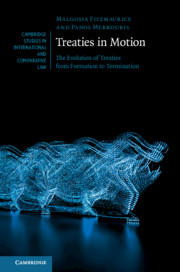Book contents
- Treaties in Motion
- Cambridge Studies in International and Comparative Law: 149
- Treaties in Motion
- Copyright page
- Contents
- Figures
- Tables
- Acknowledgements
- List of Abbreviations
- Table of Cases
- Table of Treaties
- 1 Motion as a Notion
- 2 Treaty Genesis
- 3 Consent to Be Bound
- 4 Treaty Interpretation and Its Rules
- 5 Amendment/Modification/Revision of Treaties
- 6 Treaties and Their Phthora
- 7 Concluding Remarks
- Bibliography
- Index
- Cambridge Studies in International and Comparative Law
4 - Treaty Interpretation and Its Rules
Of Motion through Time, ‘Time-Will’, and ‘Time-Bubbles’
Published online by Cambridge University Press: 05 June 2020
- Treaties in Motion
- Cambridge Studies in International and Comparative Law: 149
- Treaties in Motion
- Copyright page
- Contents
- Figures
- Tables
- Acknowledgements
- List of Abbreviations
- Table of Cases
- Table of Treaties
- 1 Motion as a Notion
- 2 Treaty Genesis
- 3 Consent to Be Bound
- 4 Treaty Interpretation and Its Rules
- 5 Amendment/Modification/Revision of Treaties
- 6 Treaties and Their Phthora
- 7 Concluding Remarks
- Bibliography
- Index
- Cambridge Studies in International and Comparative Law
Summary
This chapter tackles the issue of interpretation from the point of view of motion and time, mainly motion as change in space-time (kata topon kai chronon metavole), which depending on the interpretation could lead to an increase (auxesis), diminution (meiosis) of the treaty. This is mainly evidenced through the concepts of the principle of contemporaneity and evolutionary interpretation, and the chapter proceeds to demonstrate that the choice between these two is dependent on the ‘time-will’ of the parties. However, even evolutive interpretation has its limits and should never lead to an alteration (alloiosis) of the treaty. This chapter also analyses the rules of interpretation themselves, ie whether interpretative rules are constants, immutable and perennial ones, in the system of the law of treaties or whether they are, as any other rule, potentially susceptible to motion through time and change. This chapter demonstrates the false premise of the immutability of the rules of interpretation, and elaborates on the consequences of this to the choice between contemporaneous (static) and evolutive interpretation.
Keywords
- Type
- Chapter
- Information
- Treaties in MotionThe Evolution of Treaties from Formation to Termination, pp. 121 - 181Publisher: Cambridge University PressPrint publication year: 2020



